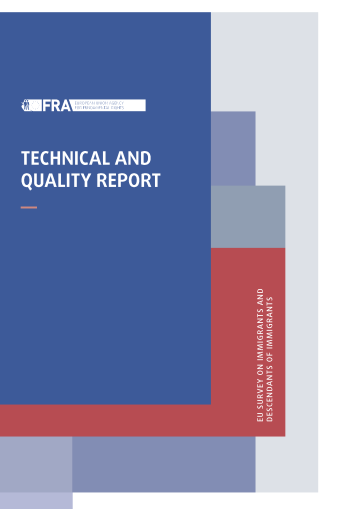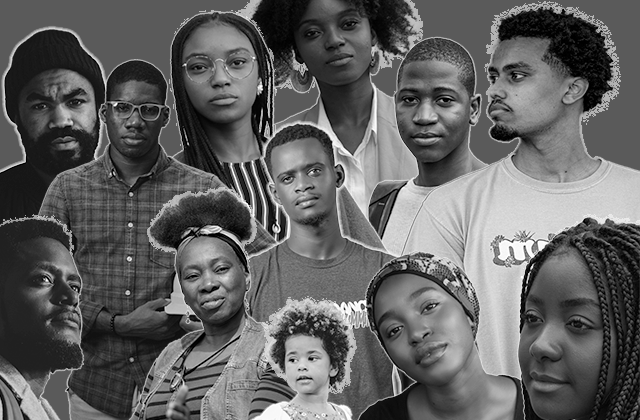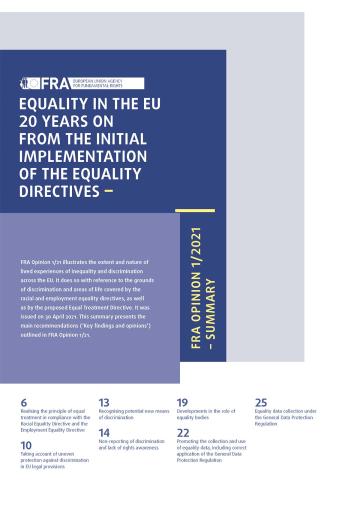- Why was this survey carried out?
-
Despite binding EU anti-discrimination legislation since 2000 and legal developments in recent years, Muslims in the EU continue to face widespread racism, hatred and discrimination.
The EU Fundamental Rights Agency (FRA) conducts regular surveys to provide the EU and its Member States with reliable data on the views and experiences of immigrants and their descendants in the EU. The findings support policymakers in developing evidence-based policies to tackle racism and discrimination, such as the first ever EU anti-racism action plan.
This report focuses on the experiences of respondents who self-identify as Muslims when asked about their religion. The report covers 13 EU countries: Austria, Belgium, Denmark, Finland, France, Germany, Greece, Ireland, Italy, Luxembourg, the Netherlands, Spain and Sweden.
It looks at developments since 2016, when FRA’s first comparative report ‘Muslims – Selected findings’ was published.
It is part of a wider survey on immigrants and descendants of immigrants (2022). As part of this survey, FRA has already published the report ‘Being Black in the EU’.
In the absence of any other official data on the experiences of Muslims in the EU, EU institutions and Member States should use the survey findings to assess progress on commitments in national action plans and policies against racism. This evidence should also inform the development of future EU anti-racism policies.
- How was the survey carried out?
-
For this report, the survey collected information from 9,604 respondents who self-identify as Muslim in 13 EU countries: Austria, Belgium, Denmark, Finland, France, Germany, Greece, Ireland, Italy, Luxembourg, the Netherlands, Spain and Sweden.
An international Belgium-based survey company, Ipsos NV, collected the survey data in the 13 EU countries under the supervision of FRA staff.
They collected the data either in person or online:
- Face-to-face interviews - Belgium, France, Greece, Ireland, Italy, Spain and Sweden;
- Online - Austria, Denmark, Finland, Germany, and Luxembourg;
- Through social media - the Netherlands.
FRA developed the questionnaire based on its previous surveys on immigrants and their descendants - EU MIDIS II Survey (2016), Roma and Travellers Survey (2019) and Roma Survey (2019). FRA also translated all survey materials into national languages of the survey countries, as well as Arabic, Kurdish, Somali, Tamazight, Tigrinya and Turkish.
- When was the survey carried out?
-
The fieldwork took place between October 2021 and October 2022. During this time, measures to limit the spread of Covid-19 were in place in several countries. This affected the time required for the data collection, as well as the sampling methodology used.
- What did the survey ask?
-
The survey asked about people’s experiences of discrimination in different areas of life, including during police stops. It included questions on racist harassment and violence. It enquired about their rights awareness and integration in society.
- Who took part in the survey?
-
Respondents were either born or have at least one of the parents from North Africa, African countries south of the Sahara, Syria or Türkiye.
In France, the sample also includes respondents from overseas departments and territories, and the Caribbean.
All respondents are at least 16 years old and have been living in the survey country for at least 12 months.
46% of respondents are women, while men make up 54% of the sample. The average age is 39 years.
Almost half of respondents (48%) have citizenship of their country of residence. However, this varies significantly among the different Muslims groups – for example, only 21% of Muslim immigrants from Syria hold EU citizenship. This is because they have only come to the EU recently.
- How were respondents selected?
-
For this survey, FRA used different sampling methods to select respondents:
- in Austria, Denmark, Finland, Germany, and Luxembourg, FRA drew the sample from the population register. Respondents were contacted directly by post and asked to complete the questionnaire online.
- in France, Italy and Spain, FRA used a multistage random probability sampling design. Respondents were selected through the random route method and interviewed face-to-face.
- in Sweden, respondents were interviewed in location centres selected based on pre-defined procedures.
- in Belgium and Ireland, respondents were selected using a quota-sampling method. The quotas were defined to correspond to the target population’s characteristics. Respondents were interviewed face-to-face.
- in the Netherlands, the data were collected online through social media channels.
- The Technical Report contains more details on the sampling methodology.
- How many Muslim respondents were asked in each EU country?
-
The number of Muslim respondents in the 13 EU countries ranged from 58 in Ireland to 1527 in Germany.
- How many Muslims live in the EU?
-
According to the 2016 estimates of the Pew Research Center, about 26 million Muslims live in the EU. This corresponds to about 5 % of the total EU population. Most Muslims in the EU live in France (5.7 million), Germany (5 million) and Italy (2.9 million). Based on the 2016 estimations, the selected 13 EU Member States for the FRA survey are home to 3 out of 4 (about 75%) Muslims in the EU.
Comparing the number of Muslims covered in the 2022 survey with the general estimate of the number of Muslims in the EU, this analysis covers about 42% of all Muslims in the survey countries and around 32% of all Muslims in the EU.
However, the percentage of Muslims covered by the 2022 survey varies within countries. It surpasses 90% in Greece and Spain, is at 81% in Austria and 80% in the Netherlands and is around 70% in Belgium, Italy, France and Sweden.
- Are the survey findings representative?
-
The survey findings are representative for each target group (based on country of birth or country of birth of at least one parent) in selected survey countries.
For example, the survey findings are representative for Muslim respondents with a Turkish background in Austria or Muslim respondents from African countries south of the Sahara in Denmark.
However, the survey results are not representative in the Netherlands, where the data were collected online through social media channels and in Belgium and Ireland, where respondents were selected using quota sampling.
- Are the results comparable with previous surveys?
-
Several factors affect the comparability of survey results: different countries and target groups selected for surveying in each wave, changes and improvements in the sampling methodology, and changes in the mode of data collection. Therefore, this report focuses on comparing selected indicators only.
Measures to reduce the spread of Covid-19 may also have affected some 2022 responses, such as those about everyday activities. In this regard, the 2022 results for Sweden (impact of Covid-19 measures) and Luxembourg (change of methodology) should be interpreted with caution, especially when comparing the 2022 results with the findings of the 2016 survey.

















